Dementia in Singapore
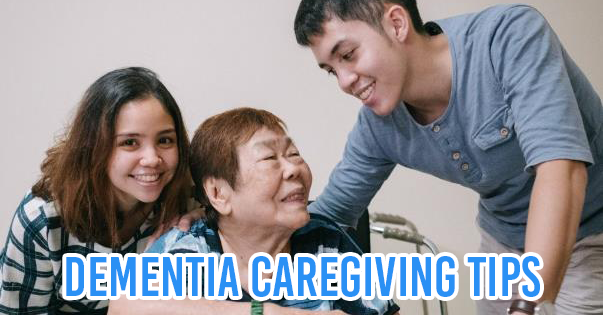
Image credit: Christel Goh
To say that I’m close to my grandma is an understatement.
While my mum had to work to support the family, my grandmother took on the role of caring for my brother and I. I remember how she used to carry me as a child and rock me to sleep. To be honest, I cannot remember a single time when I needed help and she wasn’t around – because she always was.
She was a policewoman in her younger days and I’ve looked up to her ever since I was a little girl. Her biggest attributes will always be her strength, independence and capability. Which is why the news of her being diagnosed with dementia hit me like a ton of bricks.
Seeing the first telltale signs of dementia
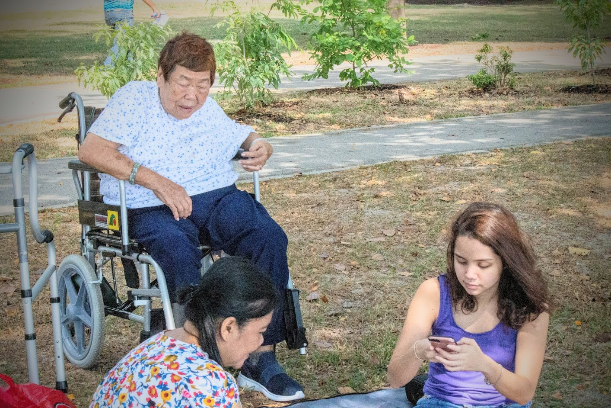
The first few months of adapting to a new lifestyle are the most challenging
Image credit: Christel Goh
It all started when her usually positive mood took a sudden turn.
She started to insist that her belongings had been stolen when she misplaced them or frantically accuse people around her of being upset with her. And when we tried to convince her otherwise, she would lash out and accuse us of calling her “crazy”.
Other times, she would simply forget what we had told her just an hour ago. Her mood swings became more apparent and frequent, ruled by paranoia and anger
Despite having suspicions about where this newfound behaviour was coming from, it was only when she was admitted to the hospital for her walking difficulties that what we had initially guessed was confirmed by the doctor – she had mild to moderate dementia.
And if you think that realisation was hard to swallow, dealing with the actual condition was even more challenging.
What was most difficult was seeing my grandma lose her independence – a basic privilege we take for granted daily. On top of needing to be helped around the house for things as simple as going to the bathroom, she was constantly losing track of the day and time.
Her health had taken a turn for the worse, and family members had to supervise her actions 24/7.
Early intervention
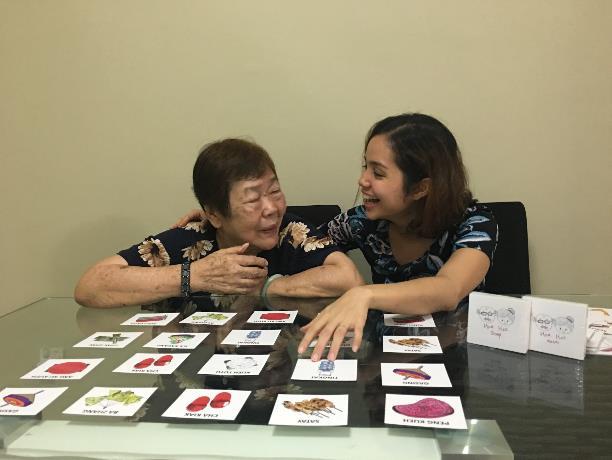
Playing a game of Hua Hee with my grandma, which helps train her memory skills.
Image credit: Christel Goh
The silver lining to it all was that her condition was diagnosed early. This meant that there was still a chance for intervention. We did a fair bit of research on the topic and found that there are ways to intervene in the early stages of dementia, and we were willing to do everything in our power to better my grandma’s condition.
In hopes of improving her mobility and strength, one of the first things my family tried was getting her to exercise daily. Research shows that physical activity reduces the risk of dementia, and for people with existing conditions, of it worsening. We hoped that the repetition of walking around or using an exercise bike would calm her down and improve her mood.
The reaction? She absolutely hated it.
Despite having the best intentions, we eventually gave in to her refusal to change and looked to other methods to cope with her condition:
Stimulating her memory with games
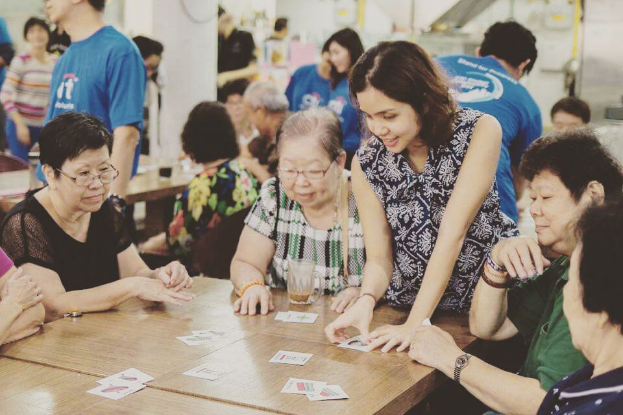
Image credit: @playhuahee
To prevent rapid cognitive decline, we turned to games to keep her mind alert. However, the tools available on the market were either overly westernised or too childish, and there wasn’t anything in between that really made my grandmother feel motivated.
This pushed me to design a specialised local card game that fit the mould. Inspired by the iconic food and memorabilia of my grandmother’s time, I created Hua Hee, a memory-matching card game that featured food and objects closer to home like tingkats and kueh tutus to help her respond better to the game.
This even gave rise to conversations about her past experiences with them, which only served as greater motivation to do more for others going through similar situations.
Helping them feel confident about themselves
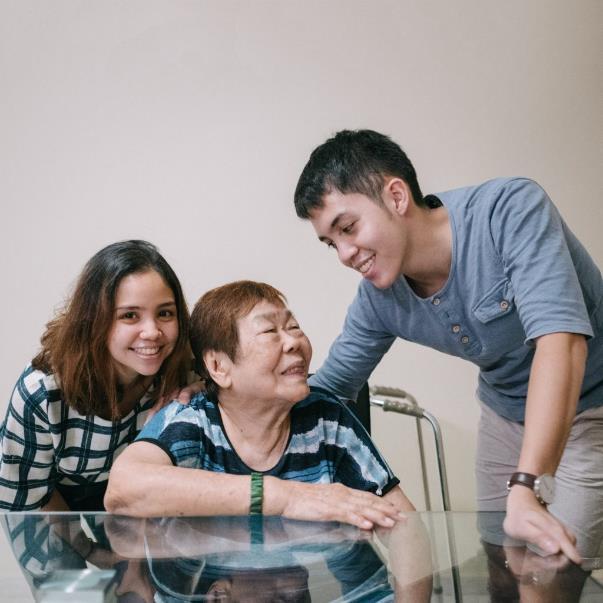
Image credit: Christel Goh
Seeing the effects that dementia had on my grandmother was painful. To remind her of the independent and strong woman she used to be, we constantly encourage her to regale us with stories of her past travels and her days as an advocate for justice.
She even enjoys striking up conversations with strangers, and has been helping my mum learn Chinese recently. Sure, she may have lost the ability to do certain things. But she’s still the same person who loves a good laugh and poking fun at the ones around her – we just have to consciously bring out those parts of her.
Dealing with dementia in the family
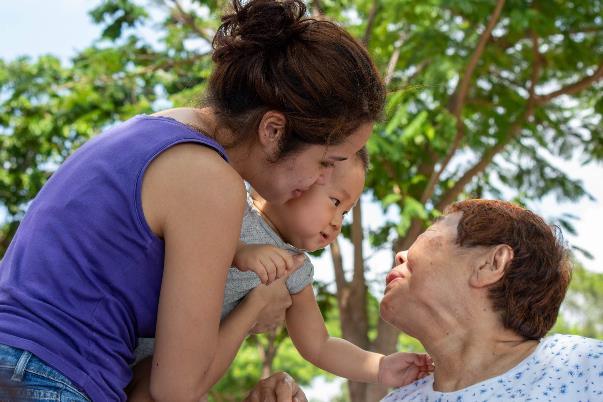
Image credit: Christel Goh
Dealing with dementia in someone you love is not a concept easy to grasp – but it was up to my family and I to persevere with a positive mindset.
The cold, hard truth: there is no cure for dementia. Once people are diagnosed with dementia, their family is usually told that things are going to get worse and all they can do is try to manage the situation.
But I’ve learnt that you shouldn’t lose hope after a diagnosis. I’ve seen my grandma’s condition get better by improving her lifestyle and eating habits.
Looking after persons with dementia
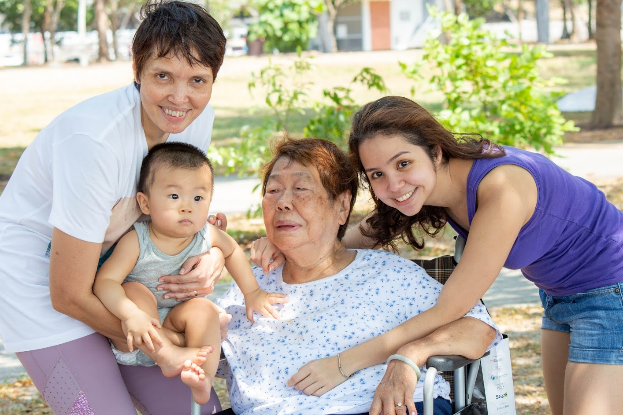
Image credit: Christel Goh
Dealing with persons suffering from dementia is not a smooth-sailing process. But there are recommended tips and methods to go about it. Here, Ms Janigi Mohan, Head of Nursing and Jacqueline Yap, Senior Staff Nurse from St Joseph’s Home share some additional advice from their firsthand experiences in caring for patients.
1 – Have good communication
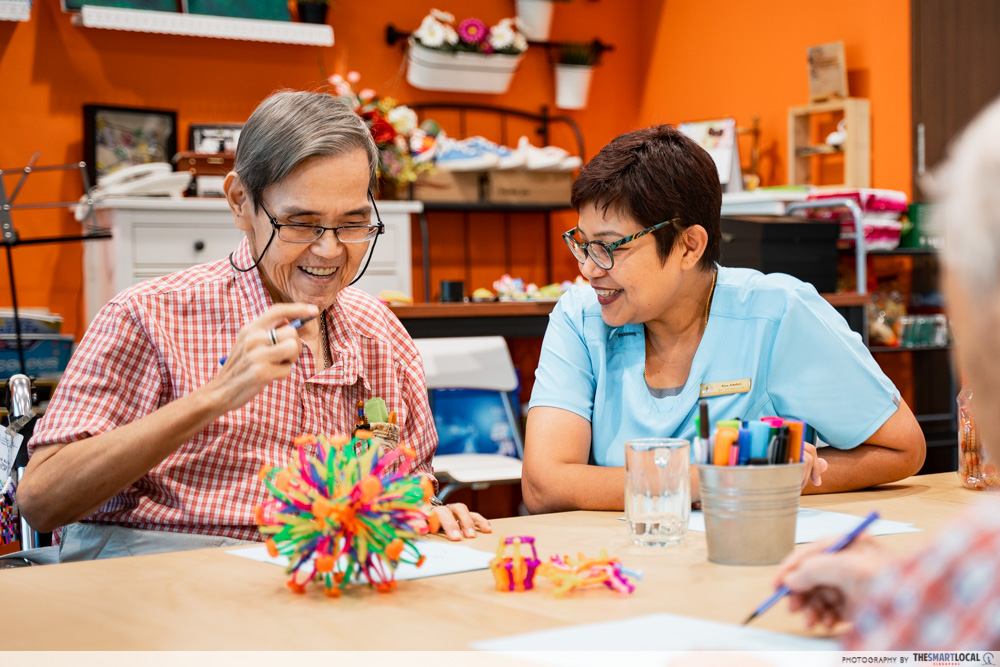
Communication is essential when dealing with persons suffering from dementia. They might have impaired verbal expression that will cause them to say the wrong words or express themselves not in the way they intended. Nurses sometimes use non-verbal methods to communicate with residents who feel more comfortable speaking in their own dialects.
Some of the best ways to take care of residents with dementia is by listening actively, and not rushing them or interrupting their life stories. Active listening involves giving careful attention, not just to the words but also to the tone of their voice.
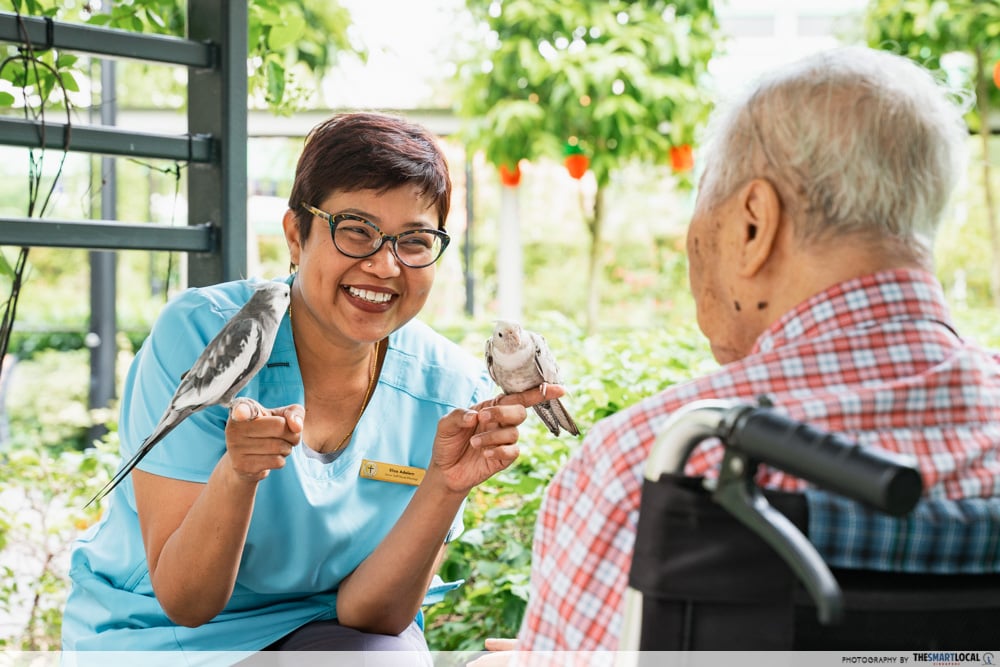 Smiling is a form of communication with the residents
Smiling is a form of communication with the residents
Be mindful to provide frequent opportunities for them to regain control, indicate their preferences, or share their opinions. They deserve to live a life as normal as the ones they knew before diagnosis, and should still be spoken to as adults and not like children.
A common example is how residents may say they haven’t eaten despite already having had their meals. The nurses will check to see if they’re hungry or thirsty before serving extra food, and remind them that their next meal is coming soon.
2 – Keep a positive outlook
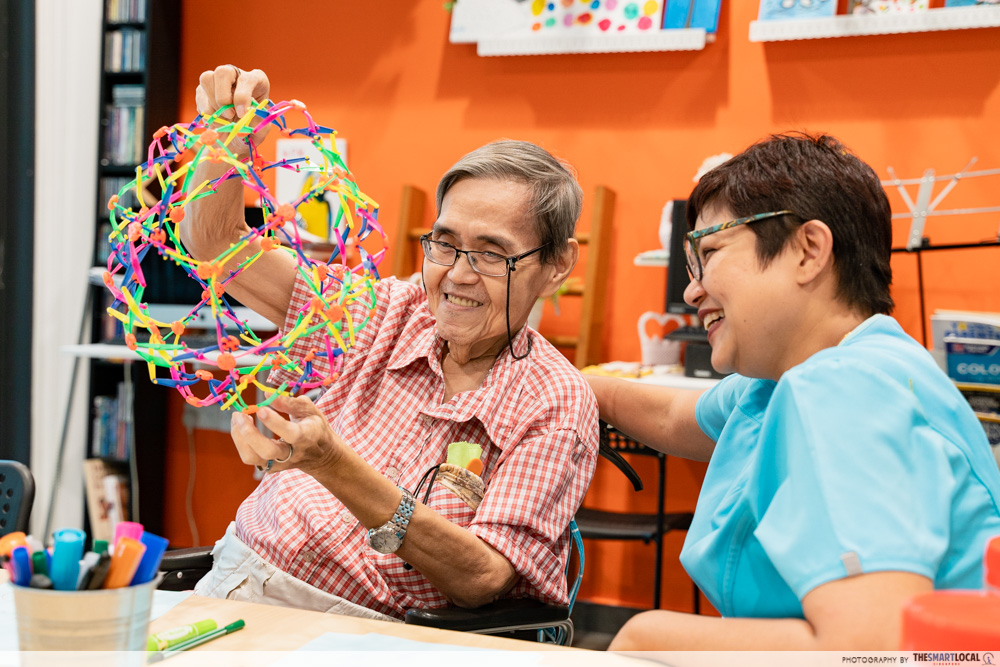
Two-way communication can get challenging at times, especially when residents may not recall what they just said to you or forget who you are. Despite this, it’s important to not get frustrated or lose patience with them, as your reaction can cause them to feel worse about themselves.
For more positive results, shift away from focusing on what they are not able to do anymore, and instead direct attention to their abilities to complete tasks like puzzles or even standing up by themselves. To see the residents’ faces light up with a sense of accomplishment can be a rewarding feeling. But it is important to refrain from treating these tasks as “tests” as that could give the patients undue stress.
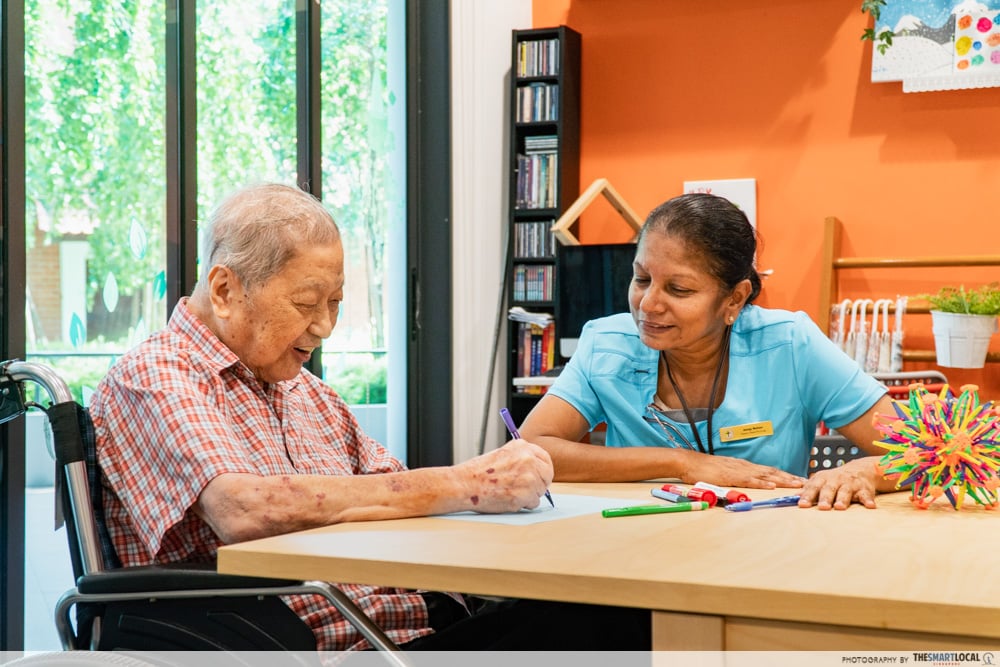
Caregivers also need to look after themselves by keeping a positive outlook. Having a strong support network, such as sharing experiences with each other can better build relationships with the residents too. Finding new ways to keep the residents engaged is also important. For example, there is a bird experience programme at Joseph’s Home where residents can enjoy animal therapy sessions and time outdoors.
3 – Be flexible to change
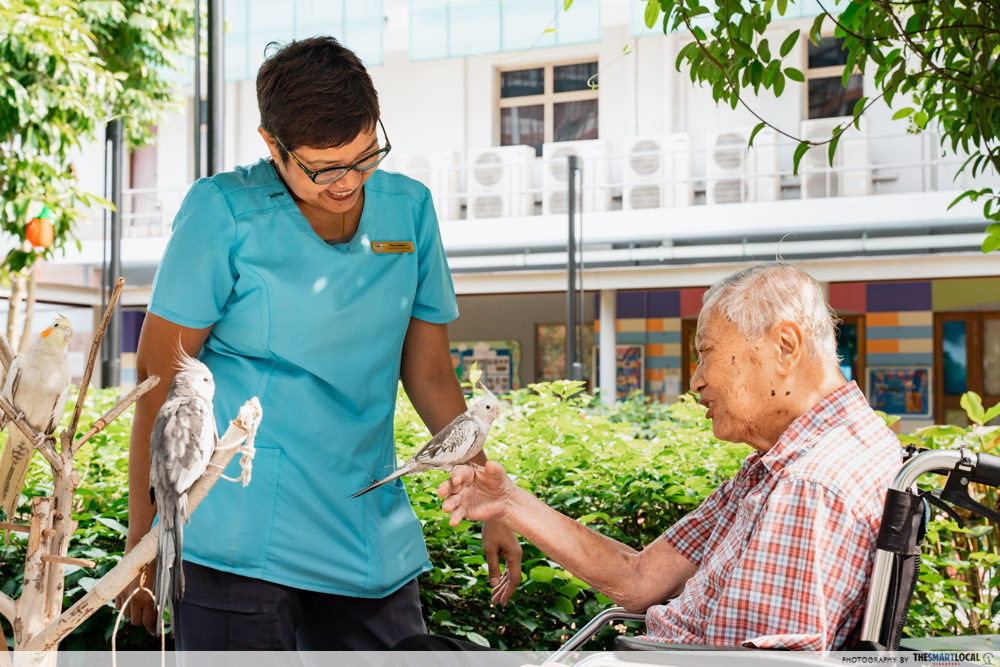
St Joseph’s Home adopts a flexible approach that is person-centred and holistic by engaging and meeting the residents’ daily needs through the following ways:
- Intergenerational Programmes, which bridge diverse groups as a source of emotional and social support for those involved.
- Enjoying fun and laughter with games, social activities and celebrating festive occasions with volunteers.
- Supporting and nurturing spiritual growth through chapel services or religious sharing sessions.
What works today may not be effective tomorrow – nurses also need to adapt and be flexible in looking after persons with dementia. No two residents are exactly alike, which means that approaches need to be customised for different people. For example, some residents may enjoy more time outdoors, while others might prefer staying in and keeping interaction to a minimum.
Making a difference with Care To Go Beyond
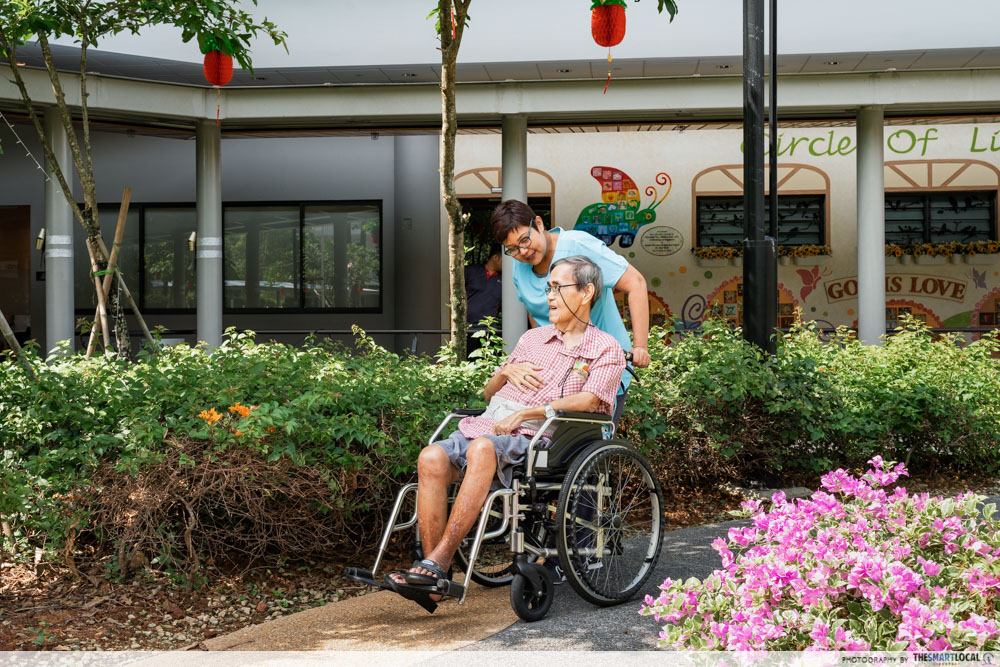
Even if you don’t have someone in your family with dementia, you can still make a difference by learning more about nursing or being a caregiver for others. The Care To Go Beyond campaign provides information about nursing and nursing opportunities.
Dementia can happen to the ones we hold dearest – and if that happens, it’s up to us to decide how to deal with it. With the right resources and knowledge, we can ensure that both us and our loved ones won’t have to struggle in the journey.
Find more information about nursing with Care To Go Beyond here
This post was brought to you by Care To Go Beyond.
The perspective of this article was written by Christel Goh.
Photography by Nadia Loewito.




